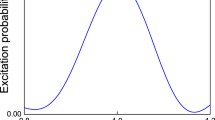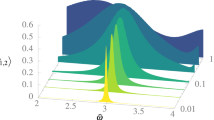Abstract
We present a quantum algorithm for preparing the ground state of a physical system by using a multi-step quantum resonant transition (QRT) method. We construct a sequence of intermediate Hamiltonians to reach the system Hamiltonian, and then, starting from the ground state of an initial Hamiltonian, the system is sequentially evolved to the ground states of the intermediate Hamiltonians step by step using the QRT method, finally reaching the ground state of the system Hamiltonian. The algorithm can be run efficiently if the overlap between the ground states of any two adjacent Hamiltonians and the energy gap between the ground state and the first excited state of each Hamiltonian are not exponentially small. By using this algorithm, preparing the ground state of a system is transformed to simulating the time evolution of a sequence of time-independent Hamiltonians. This algorithm can also be used for calculating energy eigenvalues of a physical system.



Similar content being viewed by others
References
Lloyd, S.: Universal quantum simulators. Science 273, 1073–78 (1996)
Abrams, D.S., Lloyd, S.: Quantum algorithm providing exponential speed increase for finding eigenvalues and eigenvectors. Phys. Rev. Lett. 83, 5162 (1999)
Poulin, D., et al.: Quantum algorithm for spectral measurement with lower gate count. Phys. Rev. Lett. 121, 010501 (2018)
Cubitt, T., Montanaro, A.: Complexity classification of local Hamiltonian problems. SIAM J. Comput. 45, 268 (2016)
Kempe, J., Kitaev, A., Regev, O.: The complexity of the local Hamiltonian problem. SIAM J. Comput. 35, 1070 (2006)
Schuch, N., Verstraete, F.: Computational complexity of interacting electrons and fundamental limitations of density functional theory. Nat. Phys. 5, 732 (2009)
Whitfield, J.D., Love, P.J., Aspuru-Guzik, A.: Computational complexity in electronic structure. Phys. Chem. Chem. Phys. 15, 397 (2013)
Kitaev, A.Y.: Quantum measurements and the Abelian Stabilizer Problem, e-print quant-ph/9511026 (1995)
Aspuru-Guzik, A., Dutoi, A.D., Love, P.J., Head-Gordon, M.: Simulated quantum computation of molecular energies. Science 309, 1704 (2005)
Yung, M.-H., et al.: From transistor to trapped-ion computers for quantum chemistry. Sci. Rep. 4, 3589 (2014)
Peruzzo, A., et al.: A variational eigenvalue solver on a photonic quantum processor. Nat. Commun. 5, 4213 (2014)
McClean, J., Romero, J., Babbush, R., Aspuru-Guzik, A.: The theory of variational hybrid quantum-classical algorithms. New J. Phys. 18, 023023 (2016)
O’Malley, P.J.J., et al.: Scalable quantum simulation of molecular energies. Phys. Rev. X 6, 031007 (2016)
Motta, M., et al.: Determining eigenstates and thermal states on a quantum computer using quantum imaginary time evolution. Nat. Phys. 16, 205 (2019)
Farhi, E., Goldstone, J., Gutmann, S.: A Numerical Study of the Performance of a Quantum Adiabatic Evolution Algorithm for Satisfiability, e-print quant-ph/0007071v1 (2000)
Farhi, E., et al.: A quantum adiabatic evolution algorithm applied to random instances of an NP-complete problem. Science 292, 472 (2001)
Born, M., Fock, V.: Beweis des Adiabatensatzes. Zeit. Phys. 51, 165 (1928)
Albash, T., Lidar, D.A.: Adiabatic quantum computation. Rev. Mod. Phys. 90, 015002 (2018)
Wang, H., Ashhab, S., Nori, F.: Quantum algorithm for obtaining the energy spectrum of a physical system. Phys. Rev. A 85, 062304 (2012)
Wang, H.: Quantum algorithm for obtaining the eigenstates of a physical system. Phys. Rev. A 93, 052334 (2016)
Li, Z., et al.: Quantum simulation of resonant transitions for solving the eigenproblem of an effective water Hamiltonian. Phys. Rev. Lett. 122, 090504 (2019)
Bravyi, S., et al.: Simulation of many-body hamiltonians using perturbation theory with bounded-strength interactions. Phys. Rev. Lett. 101, 070503 (2008)
Biamonte, J.D., Love, P.: Realizable hamiltonians for universal adiabatic quantum computers. Phys. Rev. A 78, 012352 (2008)
Jordan, S.P., Farhi, E.: Perturbative gadgets at arbitrary orders. Phys. Rev. A 77, 062329 (2008)
Cao, Y., Babbush, R., Biamonte, J., Kais, S.: Hamiltonian gadgets with reduced resource requirements. Phys. Rev. A 91, 012315 (2015)
Trotter, H.F.: On the product of semi-groups of operators. Proc. Am. Math. Soc. 10, 545 (1959)
Childs, A.M.: Quantum Information Processing in Continuous Time. Ph.D. thesis, Massachusetts Institute of Technology (2004)
Aharonov, D., Ta-Shma, A.: Adiabatic quantum state generation and statistical zero knowledge. In: Proceedings of the Thirty-Fifth Annual ACM Symposium on Theory of Computing, New York, pp. 20–29 (2003)
Suzuki, M.: Fractal decomposition of exponential operators with applications to many-body theories and Monte Carlo simulations. Phys. Lett. A 146, 319 (1990)
Berry, D.W., Ahokas, G., Cleve, R., Sanders, B.C.: Efficient quantum algorithms for simulating sparse Hamiltonians. Commun. Math. Phys. 270, 359 (2007)
Childs, A.M., Maslov, D., Nam, Y., Ross, N.J., Su, Y.: Toward the first quantum simulation with quantum speedup. Proc. Natl. Acad. Sci. 115, 9456 (2018)
Childs, A. M., Su, Y., Tran, M. C., Wiebe, N and Zhu, S.: A Theory of Trotter Error. arXiv:1912.08854v2 [quant-ph] (2019)
Suzuki, M.: General theory of fractal path integrals with applications to many-body theories and statistical physics. J. Math. Phys. 32, 400 (1991)
Childs, A.M., Wiebe, N.: Hamiltonian simulation using linear combinations of unitary operations. Quant. Inf. Comput. 12, 901 (2012)
Berry, D.W., Childs, A.M., Cleve, R., Kothari, R., Somma, R.D.: Simulating Hamiltonian dynamics with a truncated Taylor series. Phys. Rev. Lett. 114, 090502 (2015)
Berry, D.W., Childs, A.M., Cleve, R., Kothari, R., Somma, R.D.: Exponential improvement in precision for simulating sparse Hamiltonians. In: Proceedings of the Forty-Sixth Annual ACM Symposium on Theory of Computing, New York, pp. 283–292 (2014)
Low, G.H., Chuang, I.L.: Optimal Hamiltonian simulation by quantum signal processing. Phys. Rev. Lett. 118, 010501 (2017)
Low, G.H., Chuang, I.L.: Hamiltonian simulation by qubitization. Quantum 3, 163 (2019)
Su, Y.: Framework for Hamiltonian simulation and beyond: standard-form encoding, qubitization, and quantum signal processing. Quantum 3, 21 (2019)
Gilyén, A., Su, Y., Low, G.H., Wiebe, N.: Quantum singular value transformation and beyond: exponential improvements for quantum matrix arithmetics. In: Proceedings of the 51st Annual ACM SIGACT Symposium on Theory of Computing (STOC 2019), pp. 193–204
McArdle, S., et. al: Quantum Computational Chemistry. arXiv:1808.10402v3 [quant-ph] (2018)
Kohn, W.: Nobel lecture: electronic structure of matterwave functions and density functionals. Rev. Mod. Phys. 71, 1253 (1999)
Schmidt, M.W., Gordon, M.S.: The construction and interpretation of MCSCF wavefunctions. Annu. Rev. Phys. Chem. 49, 233 (1998)
Wang, H., Kais, S., Aspuru-Guzik, A., Hoffmann, M.R.: Quantum algorithm for obtaining the energy spectrum of molecular systems. Phys. Chem. Chem. Phys. 10, 5388 (2008)
Levine, I.N.: Quantum Chemistry. Prentice Hall Inc, Upper Saddle River (2000)
Szabo, A., Ostlund, N.S.: Modern Quantum Chemistry: Introduction to Advanced Electronic structure Theory. Dover Publications Inc, New York (1996)
Monz, T., et al.: Realization of a scalable Shor algorithm. Science 351, 1068 (2016)
Acknowledgements
We thank S. Ashhab, H. Xiang and S. C. Li for helpful discussions. This work was supported by the National Natural Science Foundation of China (Grant No. 11275145) and the Natural Science Fundamental Research Program of Shaanxi Province of China under Grants 2018JM1015.
Author information
Authors and Affiliations
Corresponding author
Additional information
Publisher's Note
Springer Nature remains neutral with regard to jurisdictional claims in published maps and institutional affiliations.
H. Wang is supported by the National Natural Science Foundation of China under Grants 11275145 and the Natural Science Fundamental Research Program of Shaanxi Province of China under Grants 2018JM1015.
Rights and permissions
About this article
Cite this article
Wang, H., Yu, S. Quantum algorithm for preparing the ground state of a physical system through multi-step quantum resonant transitions. Quantum Inf Process 20, 40 (2021). https://doi.org/10.1007/s11128-020-02984-z
Received:
Accepted:
Published:
DOI: https://doi.org/10.1007/s11128-020-02984-z
Keywords
- Quantum computation
- Quantum simulation
- Quantum algorithm
- Quantum resonant transition
- Quantum state preparation




